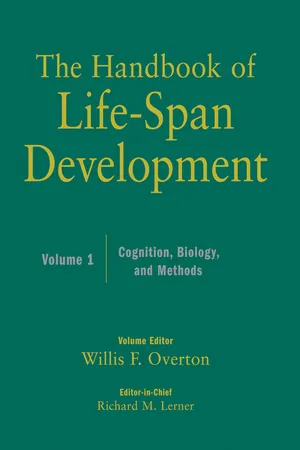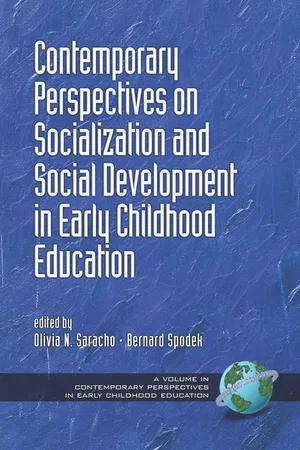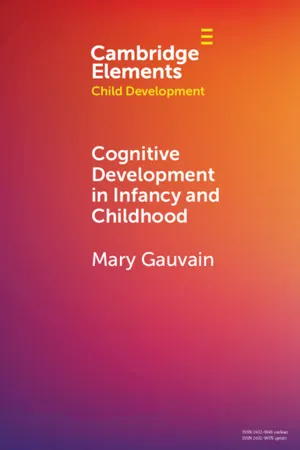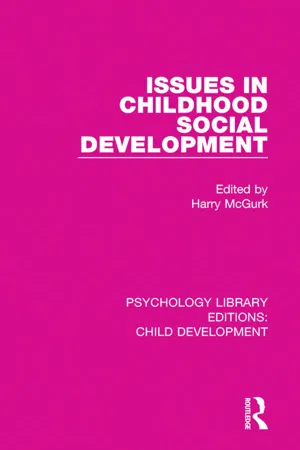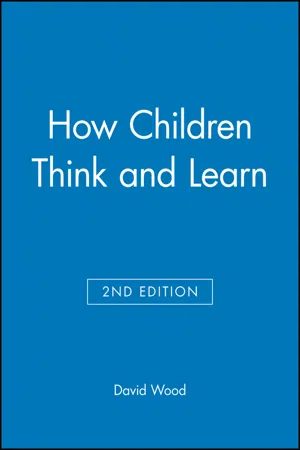Psychology
The Development of Social Cognition
The development of social cognition refers to the gradual acquisition of knowledge and understanding of social interactions, relationships, and norms. It encompasses the ability to perceive, interpret, and respond to social cues, emotions, and intentions. This developmental process is influenced by various factors such as cognitive maturation, social experiences, and cultural context.
Written by Perlego with AI-assistance
Related key terms
1 of 5
9 Key excerpts on "The Development of Social Cognition"
- eBook - ePub
The Handbook of Life-Span Development, Volume 1
Cognition, Biology, and Methods
- Richard M. Lerner, Willis F. Overton, Richard M. Lerner, Willis F. Overton(Authors)
- 2010(Publication Date)
- Wiley(Publisher)
CHAPTER 17The Development of Social UnderstandingA Relational PerspectiveJEREMY I. M. CARPENDALE and CHARLIE LEWISSocial cognition refers to our understanding of social features of the world, of ourselves and others in psychological terms, as persons with beliefs, intentions, wishes, emotions, and desires. Other people are perhaps the most complex aspect of our worlds, and they are also the most interesting. They respond in lively and appropriate ways to the infant’s gestures, the child taking a toy, and the adult’s or older adult’s announcement of good or bad news. Social understanding is visible in everyday exchanges within interpersonal relationships. Examining such interpersonal activity in early development, we see the young child’s increasing grasp of the social world in these relationships. For this reason, the question of how we come to understand the mind and how this understanding changes across the life span has been of central interest to an interdisciplinary group of scholars, including developmental scientists, primatologists, philosophers, and social and cognitive scientists.This work was supported by the Social Sciences and Humanities Research Council of Canada and the Human Early Learning Partnership (to J.I.M.C.) and the Economic and Social Research Council (grant RES-576-25-0019, to C.L.).Within developmental science, this interest has been pursued in a number of different research literatures including “person perception,” “role taking,” and “metacognition” (Chandler, 1978; Chandler & Boyes, 1982; Flavell, 1992; Shantz, 1983). These terms all refer to thinking about social matters, although each derives from a different theoretical tradition. Metacognition, for example, refers to thinking about thinking and reflects an assumption that more complex thinking involves a hierarchy of nested relations between thoughts, thought about thoughts, thoughts about thoughts about thoughts, and so on, linked recursively together (see Mascolo & Fischer, Chapter 6 of this volume). This idea has been a driving force behind the cognitive revolution since the 1950s, and most developmental scientists are paid-up members of this movement. The term social cognition - eBook - PDF
- Olivia Saracho, Bernard Spodek(Authors)
- 2015(Publication Date)
- Information Age Publishing(Publisher)
79 Contemporary Perspectives on Socialization and Social Development . . . , pages 79–97 Copyright © 2007 by Information Age Publishing All rights of reproduction in any form reserved. COGNITIVE DEVELOPMENT IN SOCIAL CONTEXT Implications for Early Childhood Education Mary Gauvain Human beings are born with an extraordinary ability to learn. This ability is fundamental to the dramatic changes in children’s understanding of and engagement with the world during infancy and childhood. Research on cognitive development seeks to describe these changes and much of this research has focused on how children think or solve problems on their own. Although this research has provided extensive information about age-related cognitive abilities, it has provided less insight into two other impor-tant and related aspects of cognitive development: how cognitive change occurs and how children think when they are with other people. Children spend much of their time playing and working alongside other people. These experiences provide children with many and varied oppor-tunities for learning that affect the nature and course of cognitive develop-ment. The social world provides children with knowledge about the world along with direction and support in the development of skills that are used to guide intelligent action. In other words, cognitive development is socially constituted, both in terms of what children think about and how children learn to use cognitive abilities to carry out goal-directed actions. CHAPTER 5 80 M. GAUVAIN This chapter discusses cognitive development as an emergent property of social experience. It begins with discussion of the social foundations of human learning from the vantage of evolutionary psychology. The chapter then turns to a theoretical perspective, the sociocultural approach, which considers cognitive development as a social process. - Mary Gauvain(Author)
- 2022(Publication Date)
- Cambridge University Press(Publisher)
Studies of what develops focus on changes over time in mental capacities, knowledge, and skills. This Element describes the develop- ment in a wide range of aspects of cognition: attention, language, social cogni- tion, memory, metacognition and executive function, and problem-solving and reasoning. Cognitive development is simultaneously universal and context-specific. Some cognitive changes are common to all human beings, and others vary within individuals and between groups or populations. This arrangement reflects a hallmark of human cognition – flexibility. People use their mental capabilities to deal with the problems of daily life. Culture, the natural eco- logical setting or habitat of human beings, plays a significant role by providing support and direction for cognitive development. 2 Cognitive Development: Coming to Understand and Act in the World The world is a complicated place. It is full of objects, some natural and others human-made. It is also full of people and activities. How do children make 1 Cognitive Development in Infancy and Childhood sense of it all, learn what the world has to offer, and then use this knowledge in productive and satisfying ways? This task, which is already huge, is further complicated because, while children are learning about the world, they are developing in many other ways. They are maturing physically, establishing relationships with the people in their lives, and acquiring and honing a large number of skills that allow them to participate in the activities around them. Cognitive development is one part of the biological, psychological, and social changes that make up human development. These changes are coordin- ated with and inform one another over time. They also have contingency relations; changes in one area may enable or facilitate changes in another area. For instance, what children perceive and the objects they explore contrib- ute to cognitive development.- eBook - ePub
- Harry McGurk(Author)
- 2017(Publication Date)
- Routledge(Publisher)
At first this seems like a bold stroke. The impact of outer forces is dampened by the child’s own cognition, thus passing some control of social development to the child himself. But on closer inspection, the introduction of cognition raises some serious questions. If cognition is defined literally as a process of self-construction with its own developmental course, then the risk is run that the environment of social agents can have minimal impact on social development. If, on the other hand, cognition is only one of several factors which intervene in development, its introduction is but a timid step. That is, cognitive theory becomes just another version of the old input-output model with its intervention merely adding complexity to the traditional formula.Our premise is that a different conceptualization is needed for the kind of cognition which services social development. An alternative approach is presented by way of a general framework. It is based on an interpretation of Piaget’s writings and is designed to clarify two conceptual issues: What is the nature of social knowledge? And, What is the process by which knowledge is socialized? The former question may be answered by Piaget’s treatment of knowledge as a relation. This suggests that interpersonal relations rather than the entities of ‘self’ and ‘other’ be made the basic unit of analysis. The second question may gain resolution when subject-subject interactions are made the intentional topic of social knowledge. This is to be distinguished from making knowledge a grasp of ‘other persons’ inner psychological workings’.Socialization and cognitionThe study of social development has always had two points of focus. On one side there is the child’s behaviour and on the second side there is the behaviour of other persons. The task of the social scientist is to explain the relation between them. In classical socialization theory the two sides of behaviour are said to come to a one-to-one correspondence. This is effected through the effort of other persons, called socializing agents, who influence and shape the child’s actions, thoughts and feelings. Correspondence can be achieved through direct means, such as imitation or reinforcement, or indirectly, as when parents act so as to create an internal state (e.g. ‘dependency’) which in turn controls the child’s output. - eBook - PDF
What is Psychology?
Foundations, Applications, and Integration
- Ellen Pastorino, Susann Doyle-Portillo, Ellen Pastorino(Authors)
- 2021(Publication Date)
- Cengage Learning EMEA(Publisher)
Understanding cognitive theories of development such as Piaget’s and Vygotsky’s help teachers design and adjust lessons and activi- ties to the developmental age and abilities of their students. Understanding the psychosocial devel- opment of children and teens also helps educators foster positive social classroom environments for young people’s social, emotional, and academic learning. Understanding typical patterns of cog- nitive and social development also helps teachers recognize when their students may be in need of additional resources for developmental delays or enrichment. Educators’ developmental knowledge helps students thrive! weedezign/Shutterstock.com Copyright 2022 Cengage Learning. All Rights Reserved. May not be copied, scanned, or duplicated, in whole or in part. Due to electronic rights, some third party content may be suppressed from the eBook and/or eChapter(s). Editorial review has deemed that any suppressed content does not materially affect the overall learning experience. Cengage Learning reserves the right to remove additional content at any time if subsequent rights restrictions require it. Cognitive Development in Infancy and Childhood 395 9.3.4 Moral Reasoning: How We Think About Right and Wrong Consider the following situation: An automatic teller machine (ATM) dispenses $10,000 to you, and there is no way that this error would ever be discovered. You keep the money, but you donate half of it to the local food bank. Should you have kept the money? How did you decide what to do? Your answer to this situation would provide clues to psychologists about your level of moral reasoning, or how you distinguish right from wrong. Two well-known theories on moral devel- opment are Lawrence Kohlberg’s stages of moral reasoning and Carol Gilligan’s ethic of care. - eBook - PDF
On Being a Client
Understanding the Process of Counselling and Psychotherapy
- David Howe, Author(Authors)
- 1993(Publication Date)
- SAGE Publications Ltd(Publisher)
9 The Development of Social Understanding Studies of the way children learn to understand their social world explain both how and why we need to understand other minds. Human beings seem to have an inveterate interest in what other people are thinking, intending and feeling. Babies enter a complex social world in which they instandy become active participants (Dunn, 1988: 1). From the day they are born, infants have diverse and complex relationships with other members of that world. By their third year, children show a flourishing interest in other people's behaviour; they have a practical knowledge of the mental states of their fellows and they are curious about other minds. Recognizing that other people have feelings, intentions and minds of their own is an important achievement in the process of becoming human and forming social relationships (Dunn, 1991: 51). Looking at family life and the complex emotional environment in which the baby finds herself, it becomes apparent why young children need to make sense of what is happening. *It is clearly extremely adaptive to be able to read** and anticipate the feelings and actions of the people who share your family world - especially those with whom you compete for parental love and affection* (Dunn, 1986: 103). We all need to make sense of social relationships and understand the rules that govern the behaviour and actions of those around us. People -whether in families, work groups or social gatherings - constantly discuss other people in terms of their intentions, feelings, beliefs, desires and motives. If we are to succeed as human beings we need to be competent in social relationships. We must develop powers of recognizing and shar-ing emotional states, of interpreting and anticipating other people*s reactions and of understanding the relationships between people (Dunn, 1988: 5). - eBook - PDF
- Ross D. Parke, Glenn I. Roisman, Amanda J. Rose(Authors)
- 2019(Publication Date)
- Wiley(Publisher)
However, this theory provides little insight into how social-cognitive process- ing changes with age. The theory has also been criticized for its lack of attention to emotional factors and how they modify cognitive decision making in social encoun- ters (Arsenio & Lemerise, 2010; Lemerise & Arsenio, 2000). It presents a profile of a thoughtful, reflective child who goes through a series of deliberate cognitive- processing steps before taking action. It does not account for the fact that much social interaction is routine and automatic and does not require delibera- tion. It does not account for the impulsive, reactive, even unconscious nature of social responding in familiar situations with familiar people. The value of the social information-processing approach is perhaps most evident in explaining social behavior in novel or unfamiliar social situations or as a description of how modes of social action are initially acquired. Cognitive Developmental Perspective To understand children’s social development, it is important to understand their cognitive development as well. Two major theorists—Jean Piaget and Lev Vygotsky—have shaped our understanding of cognition in childhood. Piaget’s cognitive developmental theory According to Swiss psychologist Piaget (1928), two processes play a major role in increasing children’s cognitive understanding. First, children use their current knowledge as a framework for absorption or assimilation of new experiences. Second, children modify their exist- ing knowledge through the process of accommodation of their mental structures. As they develop, children increase their understanding through the interplay between these two complementary processes. According to this viewpoint, children actively interpret and make sense of the information and events they encounter. - eBook - PDF
- Ronald Comer, Elizabeth Gould, Adrian Furnham(Authors)
- 2014(Publication Date)
- Wiley(Publisher)
Still other critics have charged that Piaget ’s theory fails to account fully for social factors, the influences that other people may have on a child ’s cognitive development (Carpendale & Lewis, 2010; Freund & Lamb, 2010). Piaget ’s theory, instead, focuses on how children guide their own development through experimentation and reflection. Later in his life, Piaget himself also wondered whether his theory said enough about the role of social experiences in development (Inhelder & Piaget, 1979; Piaget, 1972). As we will see, a contemporary of Piaget ’s had more to say about social influences on cognitive development. FIGURE 3.4 Theory of mind. Participants with a theory of mind recognize that the child in the story will look for the leftover chocolate in the blue cupboard, because the child is not aware of the mother’s switch of locations. theory of mind a recognition that other people base their behaviours on their own perspectives, not on information that is unavailable to them. CHAPTER 3 BIOLOGICAL AND COGNITIVE DEVELOPMENT 64 Adolescence LEARNING OBJECTIVE 6 Summarize the major physical, cognitive and emotional changes that take place during adolescence. With the possible exception of the first couple of years of life, the amount of change that occurs during adolescence rivals that of any other developmental passage. Most crucially, puberty begins. In the cognitive sphere, adolescents dis- play features of both children and adults, and they begin to learn how to function independently. In this section, we will describe some key biological, cognitive and social transitions that characterize this dramatic period. Physical Development Pubert y refers to the physical devel- opment of primary and secondary sex characteristics (Herdt, 2010). Primary sex characteristics are the body struc- tures that have to do specifically with the reproductive system, including growth of the testes and the ovaries. - eBook - PDF
- David Wood(Author)
- 2010(Publication Date)
- Wiley-Blackwell(Publisher)
I have already said that some neo-Piagetian theorists, including Karmiloff- Smith(1992),Halford (1992), and Case (1991), accept that the concept of mental modules needs to be integrated and accommodated within a model of development and each has proposed his or her theory which attempts to do just this. There is also widespread agreement that development and maturation take place in a cultural milieu and that, particularly in relation to theories about the later stages of develop- ment, the impact of the tools, systems of signs and means of instruction that a culture makes available has also to be acknowledged and explained in an adequate theory of intellectual growth. Although attempts to relate theories of maturation, development and learning might seem to be mere academic enterprises, they promise profound implications for the way in which we are likely to view the processes of socialization and education. 50 A decade of development Both developmental and modularity approaches stress the internal or 'endogenous' aspects of cognitive growth. The process of achieving understanding is personal, active, selective and constructive. Motiva- tion, attention and interpretation are largely driven by internal proc- esses, rather than by external incentives or instruction. Social constructivist theories of development, like learning theory accounts of expertise, stress external or 'exogenous' influences on development. The social constructivists also argue for the cultural relativity of learning processes and attribute to both social practices and sign systems a causal role in cognitive development. The means by which a culture inducts its children into its values and practices is of crucial significance within such an approach and the role of education is likely to be seen as central to our understanding of the human mind. The nature and origins of individual differences in the pathways of human development are also a major concern of this approach.
Index pages curate the most relevant extracts from our library of academic textbooks. They’ve been created using an in-house natural language model (NLM), each adding context and meaning to key research topics.
